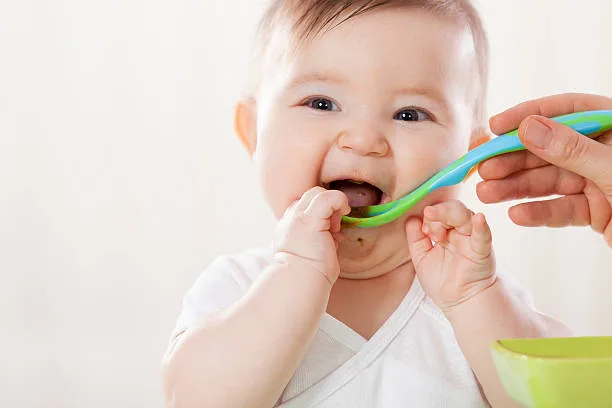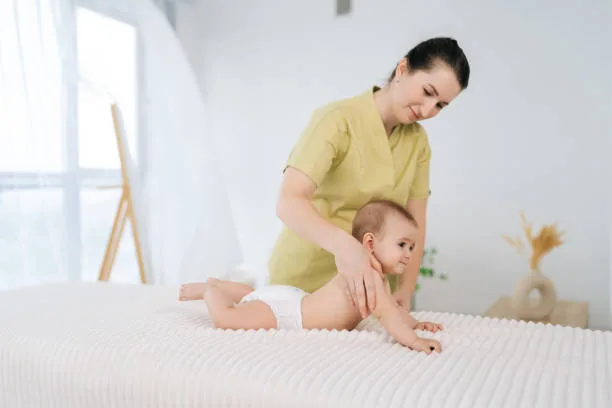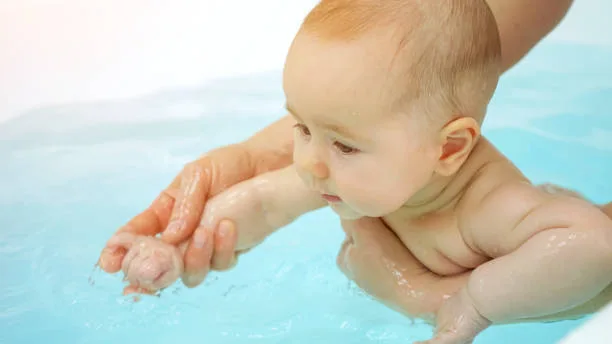“Infant Health & Safety: 0-12 Months Guide”

friends, on the topic “Infant Health & Safety: 0-12 Months Guide” I will guide you through some important points. There is a lot to learn during a baby’s first year when it comes to keeping your child healthy and safe.
There are regular doctor appointments, learning your baby’s feeding and sleeping patterns, and things you should do to make your home a safe place for your baby.
I have provided some tips, information, and resources to help you keep your infant healthy and safe.
(“Infant Health & Safety: 0-12 Months Guide”)
Safe Sleep
Practice the ABCs of safe sleep: Babies should always sleep Alone, on their Backs, in a Crib. Place your baby on his or her back for every sleep, nighttime, and nap time.
Do not put your baby to sleep on his side or tummy.
Once your baby can roll from his back to tummy and tummy to back, your baby can stay in the sleep position that he assumes. But always place your baby to sleep on his back.
Place your baby on a firm mattress in a safety-approved crib with slats no greater than 2-3/8 inches apart.
Make sure your baby’s face and head stay uncovered and clear of blankets and other coverings during sleep. If a blanket is used make sure your baby is placed “feet-to-foot” (feet at the bottom of the crib, blanket no higher than chest-level, blanket tucked in around mattress) in the crib. Remove all pillows from the crib.
Create a “smoke-free zone” around your baby.
Avoid overheating during sleep and maintain your baby’s bedroom at a temperature comfortable for an average adult.
Remove all mobiles and hanging crib toys by about the age of 5 months, when your baby begins to pull up in the crib.
Remove crib bumpers by about 12 months, when your baby can begin to climb
(“Infant Health & Safety: 0-12 Months Guide”)

How to Help Your Infant Sleep Well
Learn your baby’s signs of being sleepy. Some babies fuss or cry when they are tired, whereas others rub their eyes, stare off into space, or pull on their ears. Your baby will fall asleep more easily and more quickly if you put her down the minute she lets you know that she is sleepy.
Decide where your baby is going to sleep. Try to decide where your baby is going to sleep for the long run by 3 months of age as changes in sleeping arrangements will be harder on your baby as he gets older.
For example, if your baby is sleeping in a bassinet, move him to a crib by 3 months. Always practice the ABCs of safe sleep: Babies should always sleep Alone, on their Backs, in a Crib.
Develop a daily sleep schedule. Babies sleep best when they have consistent sleep times and wake times. Note that cutting back on naps to encourage nighttime sleep results in overtiredness and a worse night’s sleep.
Encourage the use of a security object. Once your baby is old enough (by 12 months), introduce a transitional/love object, such as a stuffed animal, a blanket, or a t-shirt that was worn by you (tie in a knot).
Include it as part of your bedtime routine and whenever you are cuddling or comforting your baby. Don’t force your baby to accept the object, and realize that some babies never develop an attachment to a single item.
Develop a bedtime routine. Establish a consistent bedtime routine that includes calm and enjoyable activities that you can stick with as your baby gets older. Examples include a bath and bedtime stories.
The activities occurring closest to “lights out” should occur in the room where your baby sleeps. Also, avoid making bedtime feedings part of the bedtime routine after 6 months.
Set up a consistent bedroom environment. Make sure your child’s bedroom environment is the same at bedtime as it is throughout the night (e.g. lighting). Also, babies sleep best in a room that is dark, cool, and quiet.
Put your baby to bed drowsy but awake. After your bedtime routine, put your baby to bed drowsy but awake, which will encourage her to fall asleep independently. This will teach your baby to soothe herself to sleep so that she will be able to fall back to sleep on her own when she naturally awakens during the night.
Sleep when your baby sleeps. Parents need sleep also. Try to nap when your baby naps, and be sure to ask others for help so you can get some rest.
Contact your doctor if you are concerned. Babies who are extremely fussy or frequently difficult to console may have a medical problem, such as colic or reflux. Also, be sure to contact your doctor if your baby ever seems to have problems breathing.
(“Infant Health & Safety: 0-12 Months Guide”)

Car Safety
Place your baby in a rear-facing car seat
Make sure you know how to install your car seat correctly
Never put your baby in front seats with an airbag
Never leave your baby alone in a car. The air can heat up quickly and a baby can die
Choose The Right Car Seat
(“Infant Health & Safety: 0-12 Months Guide”)
General Safety
Do not shake your baby – ever! Shaking your baby could cause brain damage or even death
Do not allow your baby to play with anything that might cover their face
Protect your baby from secondhand smoke. Do not smoke or allow anyone else to smoke around your baby
Do not allow your baby to play with small toys they could easily swallow and choke on
Never carry hot liquids or foods while holding your baby
(“Infant Health & Safety: 0-12 Months Guide”)
may you like to read:https://drreactivate.com/diapers-and-infant-health/

Healthy Eating
Breast milk meets all your baby’s needs for about the first 6 months of life. Between 6 and 12 months, your baby will begin to eat healthy solid food, but breast milk can still be an important source of nutrition
As your baby starts to move beyond breast milk or formula, feed them slowly and patiently. Get them to try new tastes but without force
When your baby moves into solid foods, prevent them from choking by cutting their food into small bites
(“Infant Health & Safety: 0-12 Months Guide”)
Healthy Bodies
Vaccines (shots) can protect your child from serious diseases. Talk to your baby’s doctor about vaccinations
Keeping your baby active is important for its development.
Do physical activities with them to keep their arms and legs moving throughout the day. Getting down on the floor to move helps babies become stronger while learning to explore
Confining equipment could delay your baby’s development.
Do not put your baby in a swing, stroller, bouncer seat, exercise saucer, or other confining equipment for long periods of time.
Take them out and let them move about
Signs That Your Baby is Growing and Healthy
As a mother, you are always concerned about your child’s health, but how can you know if your child is healthy?
(“Infant Health & Safety: 0-12 Months Guide”)

Here are some signs of a healthy baby to look for in your child.
Keep reading.
1- Your Baby Demands Frequent Breastfeeding
2- You are Changing 4-6 Diapers in A Day
3- Your Baby Makes Eye Contact and Smiles
4- Your Baby Responds to New Sounds
5- Your Baby Calms at the Sound of Your Voice and Your Touch
6- Your Baby is Gaining Weight and Height
7- Your Baby Looks at Patterns, Colours, and Movement
8- Your Baby Sleeps Good
9- Baby can Support His or Her Own Body Weight
Outlook!
Listed above are some of the signs of a healthy baby. If you are experiencing developmental delays, it is recommended that you seek medical advice to determine the cause and take the required steps to remedy the situation.
Healthy Minds
The signs of good mental health change as children grow and develop. They can also vary among children. But there are some general signs of good mental health that you can look for.
In the first year, a baby with good mental health will probably:
make eye contact.
show interest in people and surroundings.
enjoy attention from their parents or carers and respond with smiles or cuddles.
start to communicate with their face, voice, and gestures like waving and pointing.
start copying your gestures.
cry when they need something and calm down when their needs are met.
get upset or uncomfortable around people they don’t know and want reassurance from you, especially towards the end of their first year.
Read, talk, and sing to your baby to help their brain develop.
Limit screen time. The American Academy of Pediatrics recommends that it’s best for babies under 18 months to only use screen media for video chatting.
Provide enough opportunities for your baby to sleep – the recommended amount of sleep for infants 4 – 12 months old is 12 – 16 hours per day (over a 24-hour period, including naps).

oral health
It’s Not Too Early to Think About Oral Health
Promoting oral health from the first month to the twelfth month of a child’s life is a vital investment in their overall well-being.
Even before the eruption of the first tooth, gentle gum cleaning with a soft cloth helps establish early hygiene practices.
As teeth begin to appear, introducing a child-friendly toothbrush and a smear of fluoride toothpaste becomes crucial.
Parents should play an active role in fostering proper oral care routines, teaching gentle brushing techniques, and ensuring the baby’s gums and teeth are kept clean.
Early attention to oral health during this formative period not only helps prevent tooth decay but also sets the stage for a lifetime of good habits, emphasizing the importance of early dental check-ups and instilling practices that contribute to a healthy and happy smile from the very beginning.
It’s never too early to prioritize oral health for the holistic well-being of infants in their first year of life.
Would you like to read: https://drreactivate.com/a-guide-for-new-moms-on-postpartum-recovery/

conclusion
In conclusion, ensuring the health and safety of infants during their first 12 months of life is paramount for their overall well-being and development. This crucial period lays the foundation for a lifetime of physical and mental health.
By prioritizing a safe and nurturing environment, parents, caregivers, and healthcare professionals can significantly contribute to the optimal growth and flourishing of infants.
From creating a baby-proof home to adhering to recommended vaccination schedules, it is evident that a comprehensive approach is essential. Regular check-ups with healthcare providers, responsive parenting, and maintaining a clean and hygienic environment are integral components of safeguarding infants against potential health risks.
The significance of promoting breastfeeding, providing appropriate nutrition, and fostering positive emotional bonds cannot be overstated. These factors contribute not only to physical health but also to cognitive and emotional development, setting the stage for a healthy and resilient future.
As we navigate the intricate journey of caring for infants, continuous education, open communication with healthcare professionals, and staying informed about the latest research are crucial.
Every effort made in prioritizing the health and safety of infants represents an investment in a healthier society, ensuring that each child has the opportunity to thrive and reach their full potential.
In conclusion, the well-being of infants during their formative months is a shared responsibility that reaps lasting benefits for individuals, families, and communities alike.
What is the recommended feeding schedule for a newborn?
Newborns typically feed every 2-3 hours, but it’s essential to feed on demand. Breastfed infants may nurse more frequently.
How can I tell if my baby is getting enough breast milk or formula?
Count wet diapers (around 6 per day) and monitor weight gain. Regular check-ups with the pediatrician can confirm healthy development.
When can I introduce solid foods to my baby’s diet?
A: Around 6 months, when your baby can sit up and show signs of readiness.
What is a safe sleep environment for an infant?
Place your baby on their back to sleep, use a firm mattress, and avoid soft bedding. Keep the sleeping area free from toys and loose bedding.
How many hours of sleep does a newborn need?
Newborns sleep around 16-17 hours a day, but this varies. Sleep needs decrease as they grow.
What developmental milestones should I expect during the first year?
Milestones include rolling over, sitting, crawling, and possibly standing. Consult your pediatrician if you have concerns.
When should my baby start crawling, sitting, and walking?
Crawling can start around 6-10 months, sitting around 4-7 months, and walking around 9-16 months.
How can I baby-proof my home to ensure a safe environment?
Install safety gates, secure furniture to the wall, cover electrical outlets, and keep small objects out of reach.
How do I care for my baby’s skin, nails, and hygiene?
Bathe 2-3 times a week, trim nails carefully, and use mild, fragrance-free baby products.
What are common illnesses in infants, and how can I prevent them?
Common illnesses include colds and ear infections. Practice good hygiene, breastfeeding, and follow vaccination schedules.
How do I handle common issues like diaper rash or colic?
Change diapers frequently, use a diaper cream for rashes, and consult your pediatrician for colic management.
How can I bond with my baby during the first year?
Spend quality time, hold and cuddle your baby, talk and sing to them, and be responsive to their needs.
What are some strategies for soothing a fussy baby?
Try rocking, swaddling, offering a pacifier, or providing a calming environment.
How do I take care of my own well-being as a new parent?
Prioritize self-care, ask for help, and communicate with your partner. Don’t hesitate to seek support from friends, family, or professionals.

